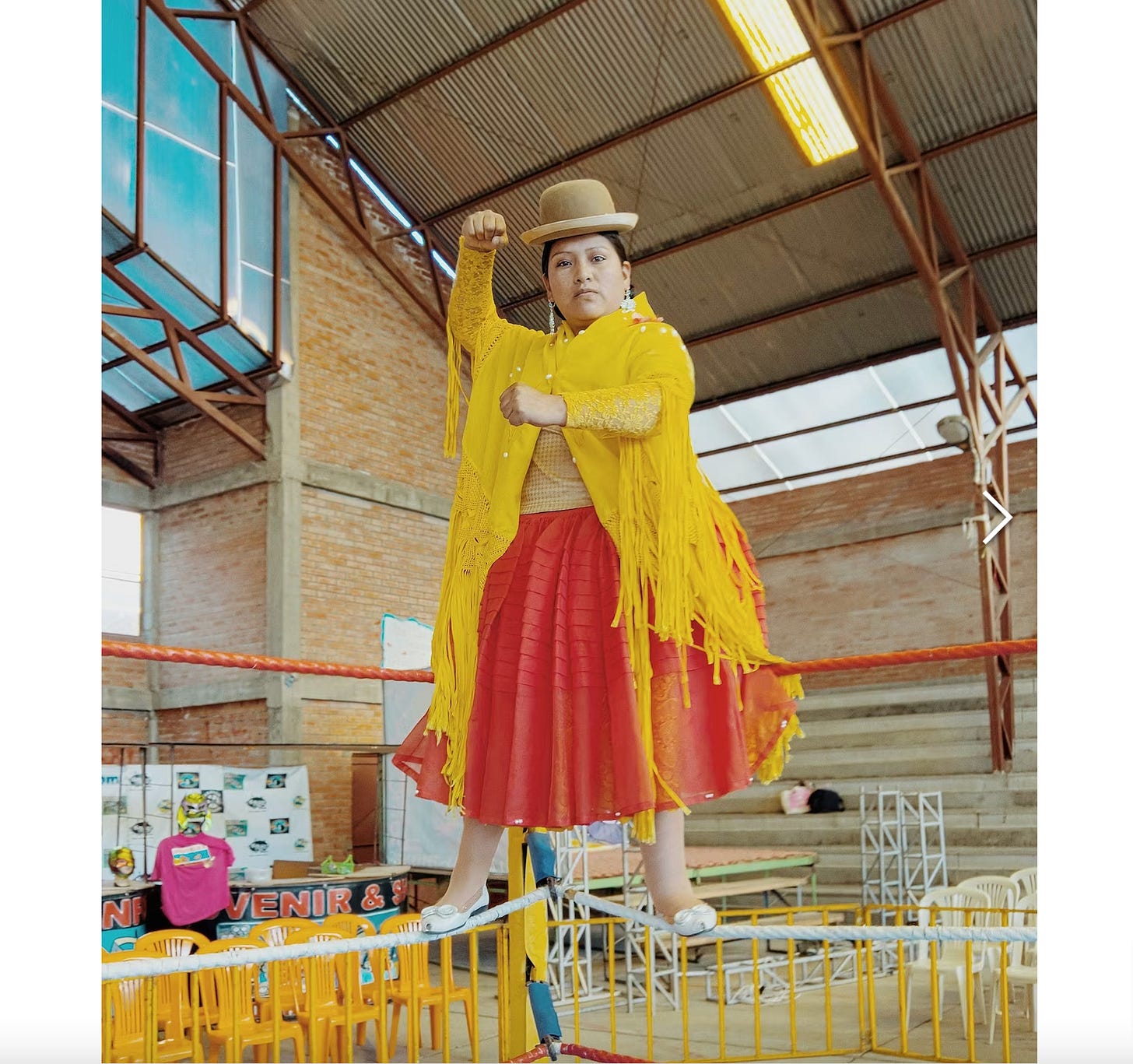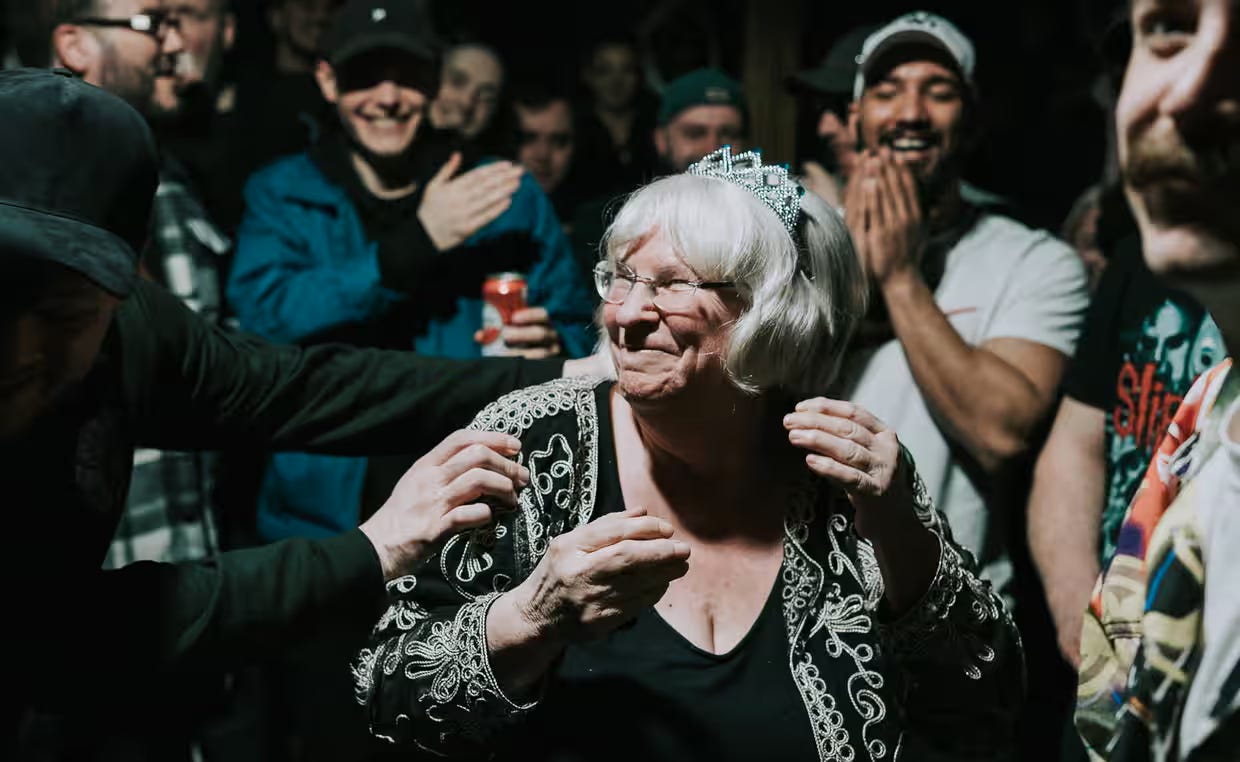Global Roundup: Bolivia’s Fighting Cholitas, Children of Bangladesh’s Birangona Women, Iranian LGBTQ Activism, World's Oldest Battle Rapper, Trans Student vs. Indian University Admissions
Curated by FG Contributor Inaara Merani
Angela, a single mother who uses her wrestling money to pay for her son's education, says, "People need some reason to fight, and mine is my son." Her 12-year-old son comes to watch all of her matches. PHOTOGRAPH BY LUISA DÖRR via National Geographic
In the highlands of Bolivia, in the city of El Alto, a crew of indigenous women, the Fighting Cholitas, are smashing stereotypes and making waves in wrestling. Also known as the Flying Cholitas, these women bring strength and style to the wrestling ring.
Historically, Cholitas were systematically ostracized and marginalized due to remaining colonial structures and attitudes. They were not permitted to be in certain public places, they were denied access to services, and they were frequently harassed. The fight for rights for Cholitas began around the 1960s, and their movement was invigorated when Evo Morales was elected as Bolivia’s first indigenous president in 2006.
The Fighting Cholitas have since taken back their heritage and broken out of the boxes that Bolivian society had placed them in.
During their matches, these fierce women are adorned in colourful bowler hats, embroidered shawls, and their vibrant layered skirts. Their fights are now quite popular among tourists, and take place every Sunday at the wrestling arena in El Alto.
Jane Radika (centre and top right) Shikha Cappucino (left), and Kohinoor Nordberg (bottom right) who were all adopted in the 70s from Bangladesh. Photo via The Guardian.
cw: sexual assault, torture
Nine months before Bangladesh was declared an independent state in December 1971, a brutal attack was launched by Pakistan against Bengalis who sought to self-rule in East Pakistan. It was a period of widespread violence, with estimates ranging from 300,000 to 500,000 people killed, all the way through to the Bangladesh government’s figure of 3 million people killed.
This war was large in scale but is not well-known outside the region. It was one of the first documented examples of rape being used as a weapon of war. It is said that between 200,000 and 400,000 women were victims of sexual assault at the time. This resulted in an estimated 25,000 pregnancies and thousands of babies. Women who were captured by Pakistani troops, and who were sexually assaulted and tortured, returned traumatized, in desperate need of medical care, and in many cases, pregnant.
In an effort to reintegrate rape survivors back into society, the prime minister and founding father of Bangladesh, Sheikh Mujibur Rahman, introduced legislation to allow late-term abortions and passed the Abandoned Children Order, which made the Ministry of Social Welfare the statutory guardians for children born out of cases of sexual assault. An international adoption campaign began to find homes for thousands of “war babies”. Women who were sexually assaulted were given the honorific title of “Birangona”, meaning war heroine, in an attempt to alleviate their social ostracism.
Today, many of the children who were adopted in countries around the world are reconnecting with their roots. Jane Radika was born in Bangladesh and moved to England in the summer of 1972 when her parents adopted her as a baby. She, like many other individuals, has struggled to find information about her birth mother because many babies were found abandoned or were left without any information. Like Radika, Shikha Cappucinno and Kohinoor Nordberg have made attempts to learn about their mothers, their adoption history, and anything about the Birangona women. It has been a difficult journey, but the women have tried to find peace and positivity in the situation.
Bangladesh, my story and my association with it has always been shrouded in violence and pain. Connected and never forgotten. But finally I know where I came from, how it looks, smells and feels – and I feel like I have come home. Bangladesh and I were created at the same time; it is a piece of me and I am a piece of it – and nothing will ever change that. – Jane Radika
Iranian Canadian journalist and restaurateur Samira Mohyeddin, left, and her younger brother, Amir Salar Mohyeddin, who is the chef, stand outside their restaurant Banu in Toronto. Photo: Heather Cassell/Bay Area Reporter.
Banu is a family-owned restaurant in Toronto, Canada, that serves as a place of resistance and refuge for Iranians, including LGBTQ+ Iranians, who have fled the country’s strict laws. Located on Queen Street West in Toronto’s second LGBTQ+ neighbourhood, the restaurant offers community, comfort, and delicious food to anyone in need.
The restaurant was opened by lesbian Iranian-Canadian journalist, Samira Mohyeddin, her gay younger brother and chef, Amir Salar Mohyeddin, and their older sister and manager, Salome Mohyeddin. Banu opened in 2005, and since then, the siblings have been serving up Iranian dishes based on their mother’s recipes, mixed with activism to support the Iranian community.
The Mohyeddin family’s background in social justice goes back almost a century, with many of their family members holding positions within activist and government organizations. Their family fled Iran and immigrated to Canada in 1979 on one of the last flights out of the country before the Iranian government grounded all flights.
The Mohyeddin siblings have helped queer Iranians out of the country, they have employed Iranian refugees at the restaurant, and they are constantly involved in activist and fundraising efforts with organizations that sponsor refugees. Banu is an activist hub and a safe haven for all Iranians in Toronto looking for a home away from home, and the restaurant is a testament to the siblings’ love for food, their culture, and social justice.
‘It’s a beautiful world of mainly young men who are there for each other’ … Joy France competing in a rap battle at Manchester Academy. Photograph: Rick Charles for Northern Heart/The Guardian.
Joy France, 66, spent her career teaching at a primary school where she specialized in special needs, and later in pupil referral units. When she was in her mid-50s, she realized that her life was predictable, and she wanted some thrill and excitement in her life. That is when she made the decision to “shake up life by following coincidences” to see where that led.
After a number of coincidences, she ended up performing at spoken word nights at local pubs and her confidence grew, and she eventually won a poetry slam. In 2014, France took an early retirement to explore her creativity. She was offered an opportunity to be a creative-in-residence at Afflecks Independent Emporium in Manchester, England, where creatives would let art grow organically. One day, teenagers stopped by and read France a poem, to which she responded with her own poem; the boys laughed and told her it was rap and that she should join battled rap.
France made her debut in battle rapping at a club in Coventry in 2018. She participates in battle rapping in which rappers insult each other and make big boasts. In England and Ireland, the Don’t Flop League is one of the biggest battle-rapping associations that France routinely participates in. After vowing to try new things before the year was up when she turned 60, France found enjoyment and passion in the creative art form of battle rapping.
I kept myself away from doing things I wanted to do. I’m past that now…I will be able to think that I enjoyed the world – and hopefully made the world a better place by interacting with people. – Joy France
A trans student has successfully challenged the National Law School of India University’s decision not to admit them. (Getty). Photo via Pink News.
A trans student in India has won their legal case against a university after being denied admission, citing India’s anti-discrimination reservation system. After being denied admission to the National Law School of India University (NLSIU), Mugil Anbu Vasantha filed a petition to challenge the university’s decision to not admit them, and his week, the state of Karnataka’s High Court directed the NLSIU to grant admission Vasantha.
Vasantha finished in the 96th percentile in one part of the all-India entrance exam conducted by the NLSIU, and had clearly indicated that they were transgender. Despite their excellent performance on the exam, the NLSIU informed them that they were not offered admission because they did not meet all the eligibility criteria.
In India, there is a reservation system that sets aside a certain number of seats in government jobs, educational institutions, and other entities, for minority groups who might otherwise have difficulty accessing these opportunities. There are also a number of legal protections in place for trans people in India. However, the University chose to deny the student admission because the institute did not have a reservation quota for trans people.
Karnataka’s High Court noted that the lack of a reservation quota for trans people violates their fundamental rights, guaranteed under the Constitution, to not be discriminated against based on their gender. The court ruled that this would amount to “denying them education on par with the other protected groups”, and that the student should be “able to fully enjoy their rights, including the right to education”.
Inaara Merani (she/her) recently completed her Masters degree at the University of Western Ontario, studying Gender, Sexuality, and Women’s Studies with a specialization in Transitional Justice. In the upcoming years, she hopes to attend law school, focusing her career in human rights law.
Inaara is deeply passionate about dismantling patriarchal institutions to ensure women and other marginalized populations have safe and equal access to their rights. She believes in the power of knowledge and learning from others, and hopes to continue to learn from others throughout her career.






